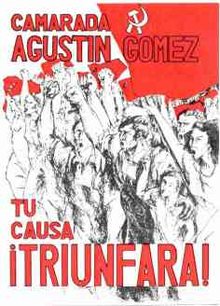Communist Party of Spain (8th and 9th Congresses)
- Communist Party of Spain (8th and 9th Congresses)
-

PCE (
VIII-
IX)
sticker honouring Augustín Gómez
The Communist Party of Spain (8th and 9th Congresses) (in Spanish: Partido Comunista de España (VIII y IX Congresos)) was a pro-Soviet splinter group of Communist Party of Spain (PCE).
PCE (VIII-IX) was one of many groups that broke away from PCE during the period when Santiago Carrillo held the post of PCE general secretary and directed the party towards Eurocommunism; it was founded in 1971. A prominent leader of the new party was Augustín Gómez. It published a magazine called Mundo Obrero (same name as the publication of PCE).
In 1980 PCE (VIII-IX) fused with Workers' Communist Party to form the Unified Communist Party of Spain. PCEU was later instrumental in creating the Communist Party of the Peoples of Spain in 1982.
Categories: - Political parties established in 1971
- 1980 disestablishments
- Communist parties in Spain
Wikimedia Foundation.
2010.
Look at other dictionaries:
Communist Party of Spain (disambiguation) — Communist Party of Spain may refer to: Communist Party of Spain (main), founded in 1921, currently the third largest political party in Spain Communist Party of Spain (8th and 9th Congresses), a splinter group that existed 1971–1980 Communist… … Wikipedia
Workers' Communist Party (Spain) — Workers Communist Party (in Spanish: Partido Comunista de los Trabajadores ) was a political party in Spain. Formed in 1977 by the Left Opposition of PCE.PCT had a youth wing called Workers Communist Youth ( Juventudes Comunistas de los… … Wikipedia
Communist Party of the Valencian Country — Communist Party of Spain Spanish Civil War Popular Front PCE federations PSUC UJCE Mundo Obrero CC.OO. United Left European Left Dolores Ibárruri Enrique Líster Santiago Carrillo Julio Anguita … Wikipedia
Europe, history of — Introduction history of European peoples and cultures from prehistoric times to the present. Europe is a more ambiguous term than most geographic expressions. Its etymology is doubtful, as is the physical extent of the area it designates.… … Universalium
china — /chuy neuh/, n. 1. a translucent ceramic material, biscuit fired at a high temperature, its glaze fired at a low temperature. 2. any porcelain ware. 3. plates, cups, saucers, etc., collectively. 4. figurines made of porcelain or ceramic material … Universalium
China — /chuy neuh/, n. 1. People s Republic of, a country in E Asia. 1,221,591,778; 3,691,502 sq. mi. (9,560,990 sq. km). Cap.: Beijing. 2. Republic of. Also called Nationalist China. a republic consisting mainly of the island of Taiwan off the SE coast … Universalium
Comintern — Third International redirects here. For Webster s Third New International Dictionary, see Webster s Dictionary. Part of the series on … Wikipedia
diplomacy — /di ploh meuh see/, n. 1. the conduct by government officials of negotiations and other relations between nations. 2. the art or science of conducting such negotiations. 3. skill in managing negotiations, handling people, etc., so that there is… … Universalium
Syria — /sear ee euh/, n. 1. Official name, Syrian Arab Republic. a republic in SW Asia at the E end of the Mediterranean. 16,137,899; 71,227 sq. mi. (184,478 sq. km). Cap.: Damascus. 2. a territory mandated to France in 1922, including the present… … Universalium
Austria — Austrian, adj., n. /aw stree euh/, n. a republic in central Europe. 8,054,078; 32,381 sq. mi. (83,865 sq. km). Cap.: Vienna. German, Österreich. * * * Austria Introduction Austria Background: Once the center of power for the large Austro… … Universalium

